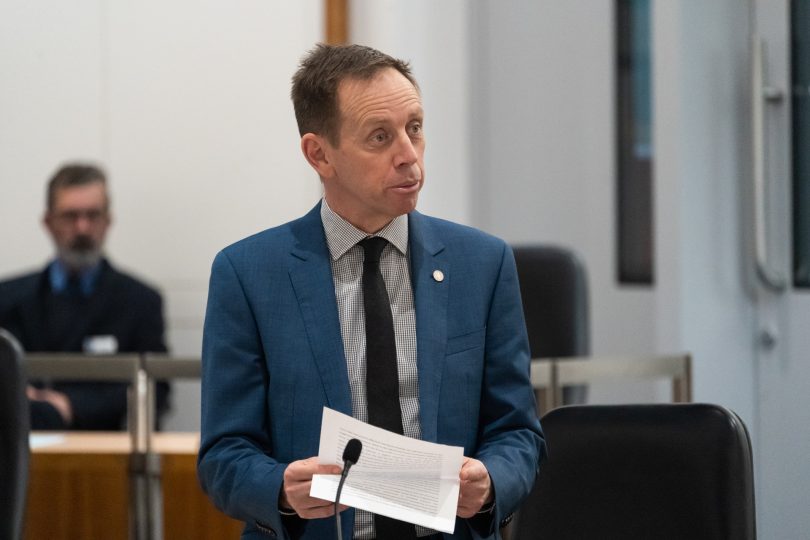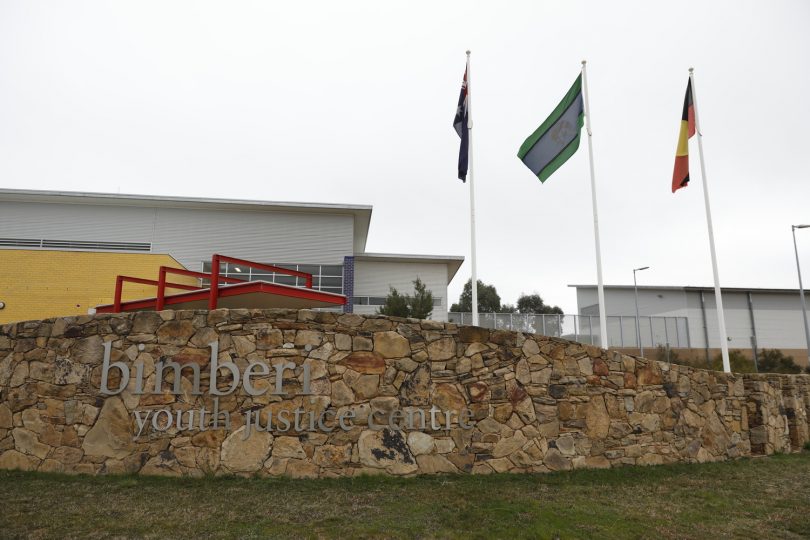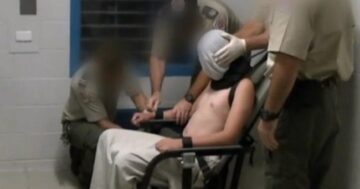
ACT Attorney-General Shane Rattenbury has committed to raising the age of criminal responsibility in the Territory to 14. Photo: Dominic Giannini.
Public consultation has shown there is strong support in the community for a proposal to raise the minimum age of criminal responsibility to 14, but ACT Policing says this age is too high.
The ACT Government received 52 community submissions to its discussion paper on the matter, with 90 per cent of these supportive of raising the age to 14, and most saying there should be no exemptions for serious crimes committed by people under the age of 14.
Currently, a person is held criminally responsible from the age of 10 in the ACT.
ACT Attorney-General Shane Rattenbury is committed to the nation-leading proposal to raise the age of criminal responsibility to 14 given it was a 2020 election promise from his party, the ACT Greens.
Mr Rattenbury previously acknowledged there is much work to do on the issue, particularly given children between 10 and 14 can cause harm to themselves and others in the community, but he has said he will not be a deterrent to the change.
“The ACT Government is committed to this important reform, including putting the integrated support and services in place that these children and young people need to put their lives back on track,” he said.

The ACT Minister responsible for Youth Justice, Emma Davidson, says Bimberi Youth Justice Centre should be a last resort for young people. Photo: File.
The ability of police to arrest young people, and exemptions for serious crimes such as murder, are among several questions the ACT Government will need to work through, it has previously stated.
ACT Policing, in its submission, provided in-principle support to the matter but said the minimum age of criminal responsibility should only be raised to 12, not 14.
It also said its preference is for the minimum age to be nationally consistent.
Of particular concern, it said, is a cohort of 13-to-14-year-olds who are engaged in “serious and violent offending” including aggravated burglary, assault, property damage, theft, trespass and weapon offences.
It is ACT Policing’s belief this cohort may increasingly engage in such behaviours if there are no repercussions in the criminal justice system.
It said it would continue to focus on attempting to divert the 13-to-14-year-old cohort away from the system, even if the age of criminal responsibility is raised.
A recently released independent review into possible models for the ACT Government to adopt stressed the need for wraparound services, including after-hours services and crisis services.
ACT Minister for Families and Community Services Rachel Stephen-Smith said while the public consultation on raising the age had shown it is the right thing to do, she said the implications would need to be carefully considered.
“We know that children and young people who come into contact with the youth justice system often have complex lives,” she said.
“While young people need to be accountable for the impact of their actions on others, it is better for everyone if they are supported to address their challenges and diverted from later engagement in the justice system.”
The ACT Minister responsible for Youth Justice, Emma Davidson, said raising the age of criminal responsibility is not just about legislative change, but also ensuring more people receive support for their needs and can seek support when they require it.
She previously said she wants Bimberi Youth Justice Centre to be the last resort for young offenders.
If the ACT is to raise the age of criminal responsibility to 14, it would bring the Territory in line with current United Nations standards and would constitute a national first in Australia.
Mr Rattenbury said he hopes the ACT’s progress on the issue could demonstrate to other jurisdictions in the country that there is a practical way forward to raising the age.
Raising the age of criminal responsibility was made a priority in the 2020 ACT Labor-Greens governing agreement and the bill is expected to be introduced into the Assembly in 2022.




















